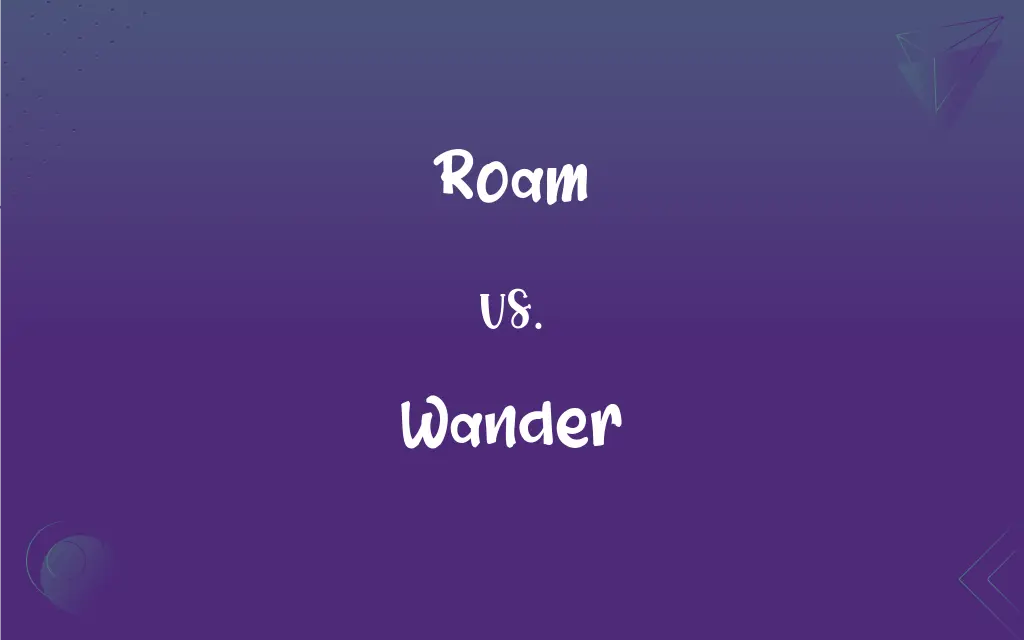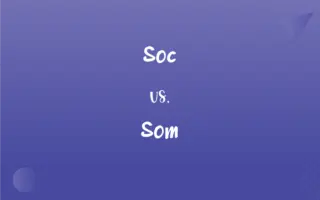Roam vs. Wander: What's the Difference?
Edited by Aimie Carlson || By Janet White || Updated on October 3, 2023
"Roam" implies moving about a wide area without a specific direction, while "wander" also means moving without a particular direction but often implies a sense of leisure or distraction.

Key Differences
Roam and Wander share a thematic element of movement without a fixed path. While roam often conjures images of expansive, perhaps aimless, motion across broad areas, wander may evoke a softer, more introspective kind of movement, possibly tied to curiosity or musing.
Roam might suggest a degree of freedom and unboundedness, where one moves without constraint across vast spaces. On the contrary, wander can signify meandering with a slower pace, where the journey is not just spatial but also psychological, often pondering or being led by curiosity.
People roam through continents, digital worlds, and various broad scopes, embodying a spirit of exploration or, at times, survival. To wander, however, possesses a dual character – it can be an external journey through spaces or an internal one through thoughts and emotions, often reflecting a more leisurely or aimless progression.
Animals might roam in the wild, where their movement is dictated by instinct, necessity, and survival, covering substantial areas in their pursuits. To wander, as humans often do through streets or forests, can suggest a willingness to become lost, to explore without urgency, and to be present amidst the journey.
Roam often finds itself associated with nomadic lifestyles, which might traverse countries and cultures out of necessity or choice. Wander can dip into a philosophical realm, where one's steps are less about physical travel and more about exploration, whether of spaces, ideas, or emotions.
ADVERTISEMENT
Comparison Chart
Definition
Move about without a fixed route
Walk leisurely without a fixed route
Implication
Suggests extensive, broad movement
Implies slower, contemplative movement
Associated Pace
Can be fast or slow
Generally slow or leisurely
Context of Use
Often used in broader contexts
Might imply more localized movement
Emotional Undertone
Can be neutral or adventurous
Often thoughtful or distracted
ADVERTISEMENT
Roam and Wander Definitions
Roam
Travel without a fixed purpose or direction.
He decided to roam the streets at night.
Wander
Meander without urgency or purpose.
She let her mind wander during the long lecture.
Roam
Explore without restraint or limits.
She loves to roam through the extensive library.
Wander
Stray from a path or course.
He tends to wander from the topic during discussions.
Roam
Wander around extensively.
They roam the desert in search of an oasis.
Wander
Move leisurely without a planned destination.
She likes to wander through the old city streets.
Roam
Be present ubiquitously.
My thoughts roam around various possibilities.
Wander
Go slowly with no particular goal or direction.
He would often wander in the park, lost in thought.
Roam
To move about without purpose or plan; wander.
Wander
Explore leisurely and aimlessly.
They wander through the forest, enjoying nature.
Roam
To turn the attention from one subject to another with little clarity or coherence of thought
I could hear the speaker, but my thoughts were roaming.
Wander
To move about without a definite destination or purpose.
Roam
To move or pass over the body
His hands roamed over her body.
Wander
To go by an indirect route or at no set pace; amble
We wandered toward town.
Roam
To be directed without apparent purpose; look in an idle or casual manner
Her eyes roamed around the room.
Wander
To proceed in an irregular course; meander
The path wanders through the park.
Roam
To use a cellphone network outside of a home service area as defined by a service plan.
Wander
To behave in a manner that does not conform to morality or norms
Wander from the path of righteousness.
Roam
To wander over or through
Roamed the streets.
Wander
To turn the attention from one subject to another with little clarity or coherence of thought
I had a point to make, but my mind started wandering.
Roam
To be directed over or around (an area)
Her gaze roamed the beach.
Wander
To be directed without an object or in various directions
His eyes wandered to the balcony.
Roam
The act or an instance of roaming.
Wander
To wander across or through
Wander the forests and fields.
Roam
(intransitive) To wander or travel freely and with no specific destination.
Wander
To be directed around or over
Her gaze wandered the docks.
Roam
To use a network or service from different locations or devices.
Wander
The act or an instance of wandering.
Roam
To transmit (resources) between different locations or devices, to allow comparable usage from any of them.
Wander
(intransitive) To move without purpose or specified destination; often in search of livelihood.
To wander over the fields
Roam
(transitive) To range or wander over.
Gangs of thugs roamed the streets.
Wander
(intransitive) To stray; stray from one's course; err.
A writer wanders from his subject.
Roam
To go from place to place without any certain purpose or direction; to rove; to wander.
He roameth to the carpenter's house.
Daphne roaming through a thorny wood.
Wander
(intransitive) To commit adultery.
Roam
To range or wander over.
And now wild beasts came forth the woods to roam.
Wander
(intransitive) To go somewhere indirectly or at varying speeds; to move in a curved path.
Roam
The act of roaming; a wandering; a ramble; as, he began his roam o'er hill and dale.
Wander
(intransitive) Of the mind, to lose focus or clarity of argument or attention.
Roam
Move about aimlessly or without any destination, often in search of food or employment;
The gypsies roamed the woods
Roving vagabonds
The wandering Jew
The cattle roam across the prairie
The laborers drift from one town to the next
They rolled from town to town
Wander
(countable) An act or instance of wandering.
To go for a wander in the park
Roam
Move about freely without a definite destination.
Buffaloes roam the vast plains freely.
Wander
(uncountable) The situation where a value or signal etc. deviates from the correct or normal value.
Polar wander
Baseline wander in ECG signals
Wander
To ramble here and there without any certain course or with no definite object in view; to range about; to stroll; to rove; as, to wander over the fields.
They wandered about in sheepskins and goatskins.
He wandereth abroad for bread.
Wander
To go away; to depart; to stray off; to deviate; to go astray; as, a writer wanders from his subject.
When God caused me to wander from my father's house.
O, let me not wander from thy commandments.
Wander
To be delirious; not to be under the guidance of reason; to rave; as, the mind wanders.
Wander
To travel over without a certain course; to traverse; to stroll through.
Wander
Move about aimlessly or without any destination, often in search of food or employment;
The gypsies roamed the woods
Roving vagabonds
The wandering Jew
The cattle roam across the prairie
The laborers drift from one town to the next
They rolled from town to town
Wander
Be sexually unfaithful to one's partner in marriage;
She cheats on her husband
Might her husband be wandering?
Wander
Go via an indirect route or at no set pace;
After dinner, we wandered into town
Wander
To move or cause to move in a sinuous, spiral, or circular course;
The river winds through the hills
The path meanders through the vineyards
Sometimes, the gout wanders through the entire body
Wander
Lose clarity or turn aside especially from the main subject of attention or course of argument in writing, thinking, or speaking;
She always digresses when telling a story
Her mind wanders
Don't digress when you give a lecture
FAQs
Does “roam” always suggest physical movement?
No, “roam” can also imply moving freely in non-physical realms, like a mind roaming through thoughts.
Does “wander” imply a slow pace?
Generally, “wander” conveys a leisurely or aimless movement, often without urgency.
Can “roam” imply a wide geographical movement?
Yes, “roam” often suggests movement across wide or varied areas or contexts.
Is “wander” always physical?
No, “wander” can also imply mental or emotional drifting, like allowing one’s mind to wander.
Can “roam” be used in a digital context?
Yes, it’s common to say data or signal “roams” in technological contexts.
About Author
Written by
Janet WhiteJanet White has been an esteemed writer and blogger for Difference Wiki. Holding a Master's degree in Science and Medical Journalism from the prestigious Boston University, she has consistently demonstrated her expertise and passion for her field. When she's not immersed in her work, Janet relishes her time exercising, delving into a good book, and cherishing moments with friends and family.
Edited by
Aimie CarlsonAimie Carlson, holding a master's degree in English literature, is a fervent English language enthusiast. She lends her writing talents to Difference Wiki, a prominent website that specializes in comparisons, offering readers insightful analyses that both captivate and inform.































































